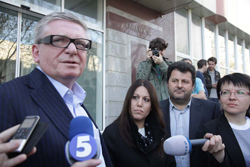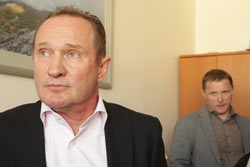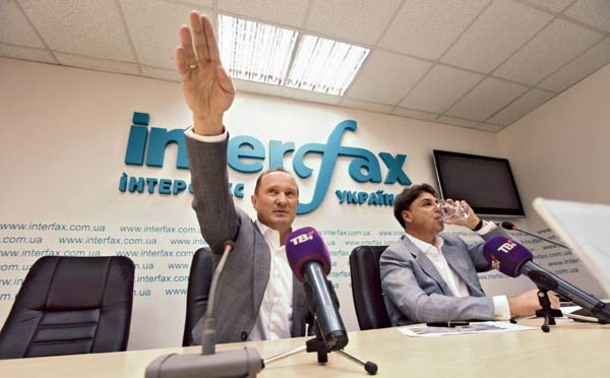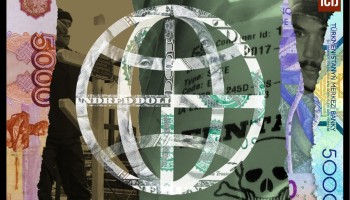The barred managers say their station has been taken over by raiders who have literally stolen the company. The truth is more complex.
The upheaval culminated on April 29 when more than 30 journalists quit the station, citing the new management’s attempts to pressure themand the lack of transparency over the way the new owners obtained control of TVi.
“We don’t see any prospects for fulfilling our professional responsibilities at the channel, because we cannot guarantee our audience fair and unbiased reports and we think that people calling themselves owners and managers of the channel have destroyed TVi’s reputation,” - a TVi journalists said in an online statement.
Prior to the takeover, the station was widely considered to be the only television outlet in Ukraine investigating corruption at top levels of government and openly criticizing Ukraine’s authoritarian President Viktor Yanukovych.
The journalists’ concerns were echoed by the international media watchdog Reporters Without Borders, which in a statement dated April 26, condemned the sudden change of management at the opposition TV station TVi. “We are disturbed by the lack of financial transparency surrounding certain media owners in Ukraine and the increasing concentration of ownership in few hands, which threatens diversity in the provision of news and information.”
A team of former TVi reporters, independently from both sides of the conflict, investigated the ownership of the station and the various changes. The new management agreed to both air and post their findings on TVi. The story’s trail took a number of twists and turns through the murky world of offshore structures amid allegations of fraud, forgery, threats, massive credit-card debt and near-bankruptcy.
Round One of the Big Fight Konstantin Kagalovsky and Orthodoxia Nikia (R) denying issuing power of attorney to Alexander Altman. (Photo by Mustafa Nayyem)
Konstantin Kagalovsky and Orthodoxia Nikia (R) denying issuing power of attorney to Alexander Altman. (Photo by Mustafa Nayyem)
The battle over TVi got its start in events that happened five years ago, in March 2008.
At that time, Vladimir Gusinski, a media mogul who in the nineties established Russia’s NTV channel, formed a partnership with his friend, Russian businessman Konstantin Kagalovsky to create and manage a television network to be known as TVi.
Gusinski had been through some tumultuous times with NTV, which began in 1993 as an independent (and some said anti-government) news organization. In 2001, after a series of reports critical of Russian leader Vladimir Putin, Gusinski was squeezed out and replaced by state-owned gas giant Gazprom.
Despite their friendship, the partnership between Gusinski and Kagalovsky did not last long. Within three years they were suing each other in the Supreme Court of New York State. The case came to trial in late 2011, and in August 2012 the judge issued a 108-page decision in Gusinski’s favor.
The decision sheds light on how Kagalovsky used offshore entities to wrest control of TVi from Gusinski:
When the partnership was formed in 2008, Gusinski controlled a company called New Media, registered in Delaware, and Kagalovsky a company called Iota LP, registered in Jersey in the Channel Islands off the coast of the UK. Each of these companies had a 50 percent stake in Delaware registered Iota Ventures LLP, and finally of the TVi channel.
They appointed Mykola Knyazhitsky as the channel’s CEO.
In the spring of 2009, the partners fell into a dispute. Kagalovsky suspected that Gusinski’s company NMDC which licensed programming content to their partnership was charging too much for movies TVi was airing.
Knyazhitsky recalled that: “Gusinski wanted to sell movies to this channel, way overpriced, at $20,000 per hour” when the going rate was $400-500 per hour. The court documents say were charging $15,300 for premiere movies and $8,000 for repeat airings.
Instead of renegotiating costs, Kagalovsky moved to take the channel away from Gusinski.
According to the court decision, “In the summer of 2009, Kagalovsky invited Knyazhitsky to his house on the French Riviera. Kagalovsky admitted that he made a deal with Knyazhitsky – in case Gusinski doesn’t step out from the channel voluntarily, Kagalovsky will squeeze him out of TVi, using the ‘traditional Russian-Ukrainian method’ – diluting Gusinski’s share in TVi.”
The result was that Kagalovsky used lawyers, offshore jurisdictions and Knyazhitsky to insert two Cyprus-based offshores--Aspida Ventures Limited and Seragill Holdings Limited--into the channel’s ownership structure, the decision says.
Then, between Sept. 22 and 24, 2009, Kagalovsky and Knyazhitsky conducted a series of transactions by which Gusinski’s share in TVi was reduced to 1 percent. Meanwhile, Kagalovsky’s Cyprus-based offshores ended up controlling 99 percent of TVi, the decision notes.
“This was done with my own hands,” Knyazhitsky said in an interview. “Back then I didn’t fully understand those things, but I had a fully legitimate power of attorney from Iota Ventures LLP.”
According to the2012 ruling of the New York court, Kagalovsky owes Gusinski $25 million plus interest, but not TVi itself. In 2009, the station was firmly in Kagalovsky’s hands.
Getting Back in the Game New TVi managers Oleh Radchenko and Artem Shevchenko (R) during April 23 standoff at the channel. (Photo by Mustafa Nayyem)
New TVi managers Oleh Radchenko and Artem Shevchenko (R) during April 23 standoff at the channel. (Photo by Mustafa Nayyem)
Four weeks ago, Kagalovsky was still in control of TVi, after even more restructurings that further muddy the picture. At that point, according to documents obtained by the Organized Crime and Corruption Reporting Project (OCCRP), Ukraine-registered Teleradiosvit held the station’s license. Teleradiosvit, in turn, was owned by another company called Media Info, also registered in Ukraine. And – completing the complicated set-up -- Wilcox Ventures, registered in the British Virgin Islands owned 99 percent of Media Info.
Kagalovsky owned 99 percent of Media Info, with the last 1 percent in the hands of Oleh Radchenko who was also the CEO.
Then everything got turned around.
On April 23, a new set of TVi owners and managers showed up at the channel accompanied by some 20 security guards.
They barred Kagalovsky and Director General Natalya Katerynchuk from entering the building. The new controllers replaced Katerynchuk with Artem Shevchenko, TVi’s host who also directs the channel’s investigations unit. Soon, the new management introduced the channel’s newest owner: Alexander Altman, an American businessman of Ukrainian descent.
How to Change Owners
As it turned out, the latest changeover was accomplished over five days.
Radchenko, who was a CEO and held one percent of Media Info shares, told OCCRP reporters that he “assigned” his share in the company to Altman and that enabled the ownership changes that followed.
Radchenko says that around April 17, Kagalovsky instructed him verbally to transfer his shares to UK-based Balmore Invest Limited.
Altman, Balmore’s beneficiary owner, got those shares. Alexander Altman (R) identifies himself the new TVi investor. TVi journalists think he got control over the channel in a non-transparent way. (Photo by Kostyantyn Chernichkin/Kyiv Post)
Alexander Altman (R) identifies himself the new TVi investor. TVi journalists think he got control over the channel in a non-transparent way. (Photo by Kostyantyn Chernichkin/Kyiv Post)
Then, Altman claimed to have a power-of-attorney letter from Wilcox, the BVI company owned by Kagalovsky that holds 99 percent of Media Info. With it he took over 94 percent of the company’s shares, giving him a total of 95 percent in TVi including Balmore’s piece. The remaining five percent were owned by Kagalovsky.
Altman has so far refused to make this critical power-of-attorney document public which is allegedly signed by the proxy director of Wilcox, Orthodoxia Nikia, a native of Cyprus.
Asked how he came to get such a powerful letter, Altman said during a press conference that it came in the mail.
“(The power-of-attorney) letter came addressed to me by a courier mail and I took it,” Altman said. “You know those (offshore) companies have directors, there are holdings. There is (Nikia) that you will be talking with for sure. So, you ask here if she signed this power of attorney, if its real or fictitious.”
However, Nikia instead flew to Kyiv amid the conflict and denied that she issued a power of attorney to Altman. On April 30, Nikia asked Ukrainian and Cyprus law enforcement agencies to investigate the theft of TVi from Wilcox.
Likewise, Kagalovsky denies any dealings with Altman regarding TVi. “There have been no agreements between myself and Altman regarding TVi,” Kagalovsky says. “Altman never had any links to the TVi channel. He wasn’t a shareholder there.”
However, Kagalovsky did acknowledge in a meeting with OCCRP reporters that he was Altman’s and Gusinski’s partner in an energy project established through Cyprus-based Wain Holdings, but claimed the project is no longer active and has no connection to TVi.
Kagalovsky said his business partners have taken over TVi using a forged power-of-attorney letter.
“There was no power of attorney like that. That’s why my hypothesis is that it’s fake,” said Kagalovsky. “It’s called forgery of documents, and it is considered a crime in all countries.”
Balmore Invest, the London-registered firm which now controls 95 percent of TVi, appears to have its own credibility problems.
Its Australian nominee director and shareholder, Rachel Amy Erickson, is listed in the UK company registry as running 139 active companies. When contacted by OCCRP, Erickson denied that the signature on Balmore’s incorporation documents was hers.
“This document is bearing my name and not my signature!!!” Erickson said in an email. “I have put in several enquiries into Balmore Invest and have no results as of yet. I need to find out who the registered agent is who lodged the paperwork for the company’s incorporation and registered the office address of 8 Shepherd Market, as there are of course 100’s of companies all registered at the same address and this address is causing me big headaches with all companies registered at this address being not companies to my knowledge!!!”
Whoever registered the company does not appear to have paid close attention to the paperwork. Between April 16 and May 3, The UK company registry notified Balmore that it would be dissolved unless its annual return was filed. It was filed and the firm was not liquidated.
Erickson claims her signature was forged on that return, and also on Balmore’s “declaration of trust” that names Altman beneficiary of this company. This document raises additional questions as it lists Altman’s US passport, which was expired before Dec. 9, 2011, when the document was issued.
Erickson is former girlfriend of Ian Taylor. Taylor is co-founder of GT Group, a business registration firm based in Auckland, New Zealand, that specialized in setting up untraceable offshore companies, fronted by proxies. Many of the firms businesses have been used by organized crime including the Sinaloa Drug cartel, Russian officials who stole $230 million in tax money, the North Korean government and others, the reports say.
In the aftermath of the scandal, New Zealand authorities removed 1,800 companies from the New Zealand Companies Register, all of them established by GT Group. Erickson denied to OCCRP having any links with GT Group and claims to have split with Taylor in 2009.
Altman wouldn’t respond to OCCRP request for comments emailed to him on May 13. Eight days later Balmore’s corporate structure underwent drastic changes.
On May 21, Balmore’s filings with the UK registrar of companies showed that Erickson was replaced as Balmore’s director by Altman. Likewise, ownership of Balmore was transferred to five UK companies. All of them were registered on April 23, the same day when new management and owners showed up at TVi.
Also effective April 23 was the transfer of Balmore’s shares from nominee holder Erickson to the four UK companies in equal shares: Invest Info One, Invest Rating Two, Invest Media Three, Invest Creative Four and Invest Active Five. In four companies the proxy shareholders and directors resigned on the same day – May 21 – and Altman took over.
The nomine in Invest Active Five is still Erickson, while Invest Info One was established by Ian Taylor. Invest Creative Four lists Angelique Elizabeth Lilley as a director and shareholder.
The New Managers New owners installed 20 more guards to block entrance to the channel. (Photo by Mustafa Nayyem)
New owners installed 20 more guards to block entrance to the channel. (Photo by Mustafa Nayyem)
On April 23, the channel’s new top management expressed optimism that it would flourish thanks to the inflow of investments Altman will bring with him. Artem Shevchenko, the newly appointed general producer, said while presenting Altman in the editorial room: “I have an internal conviction that this will be to a certain extent a second breath for the channel, connected to Mr. Altman’s investments.”
Altman himself insists he can sustain a money-losing television channel.
“Don’t you start indirectly questioning me ‘where will I get the money?’”, said Altman. “I have the money. Period.”
According to US court records, however, Altman has not been paying his debt. And it’s not about the debts accumulated by his businesses, but about debt from credit card and consumer loans.
For example, the New York State Supreme Court ruled in Westchester County that Altman must pay $31,400.22 to the credit card company FIA Card Services, $11,208.21 to Hann Financial Service Corp (car loans) and $3,105.22 to Ford Motor Credit Co also for car loans. In addition, Altman has an ongoing court case with Citibank, with the most recent session held on April 3.
All of these court cases are dated between October and November of 2012. Prior to that, Altman was also not paying his debt – all because of bad consumer loans.
The US courts database PACER shows more lawsuits involving Altman.
In 2006, he is mentioned in a complaint filed at the US District Court of the Southern District of New York. It was filed by Ingalls & Snyder, a New York-based investment advisory firm, against the companies B2BITS, Ltd. and B2B ITS Corp. and their president, Alexander Altman.
An out-of-court settlement resolved the matter, but the complaint illustrates Altman’s methods.
He was charged with fraud over the development of $590,000 in commercial software a company called I&S ordered from his companies. According to the complaint, a dispute developed between Altman’s software developers and I&S, during which Altman’s companies allegedly found a way to illegally access the I&S computer system, changed access codes, copied confidential customer information and then threatened I&S that unless they got paid more for the software, the information would be used in a manner “detrimental to I&S.”
The plaintiffs claimed that Altman used two fictitious companies--B2BITS.Ltd (in the U.S.) and B2B ITS Corp. (in UK)—that existed only on paper, while Ukraine-based programmers did all the work.
Editor’s note: The following OCCRP supported investigation first appeared on TVi channel April 30. The authors are former members of the channel’s investigative team working on Tender News and Exclamation Mark programs. A TV version can be seen here: https://www.youtube.com/watch?v=F8xdFRKVxOo&feature=youtube_gdata_player






